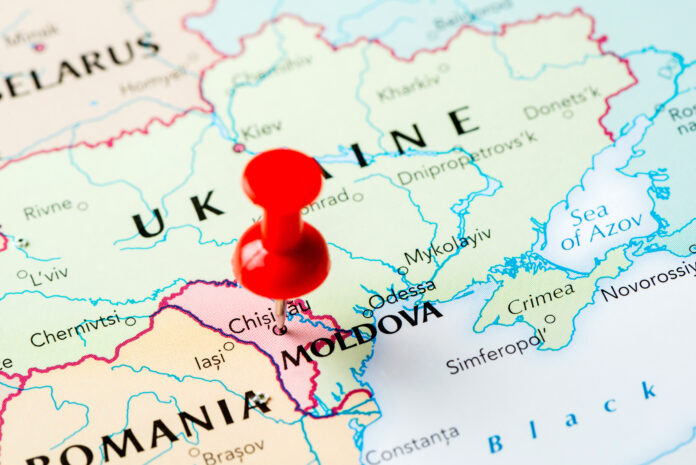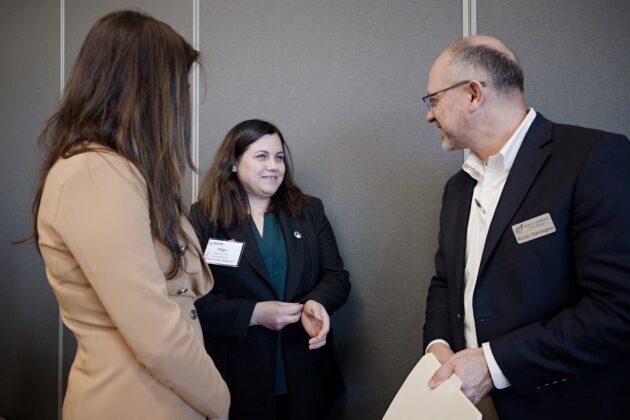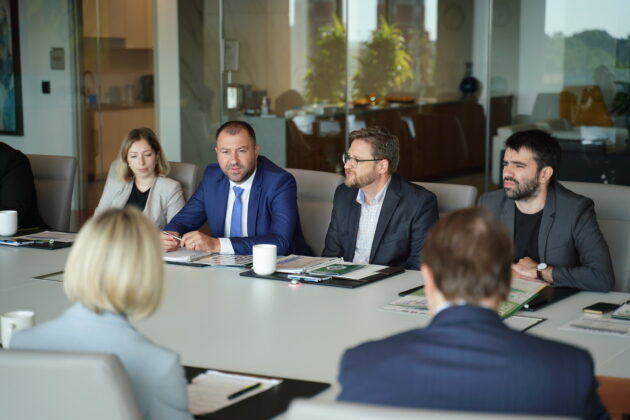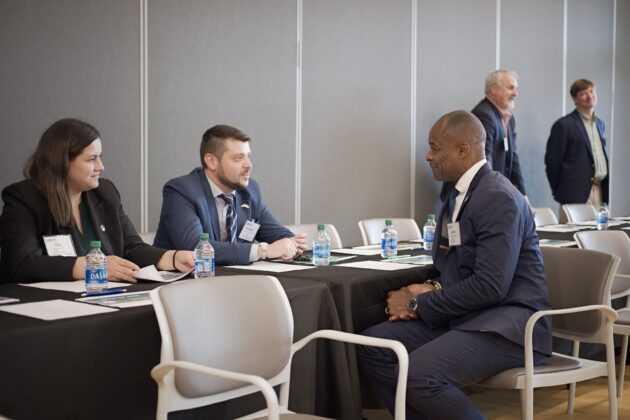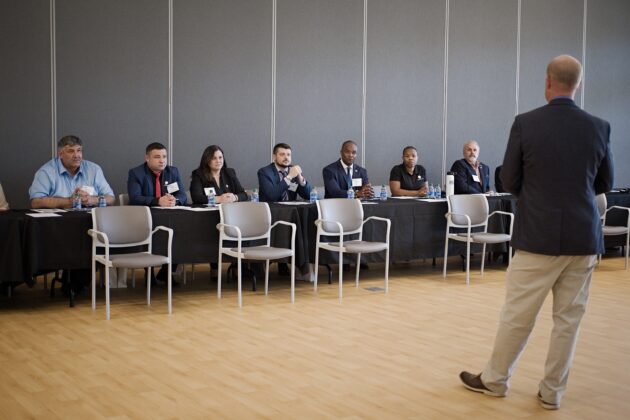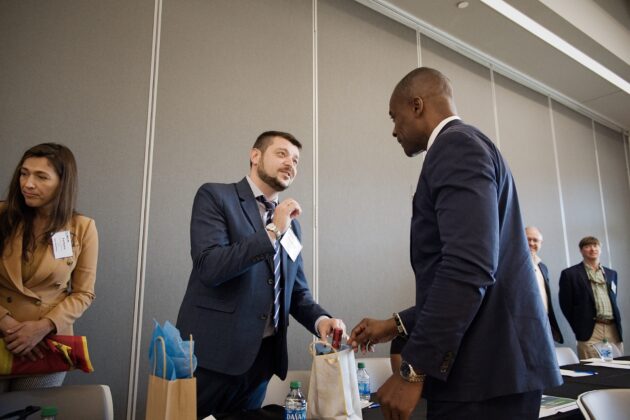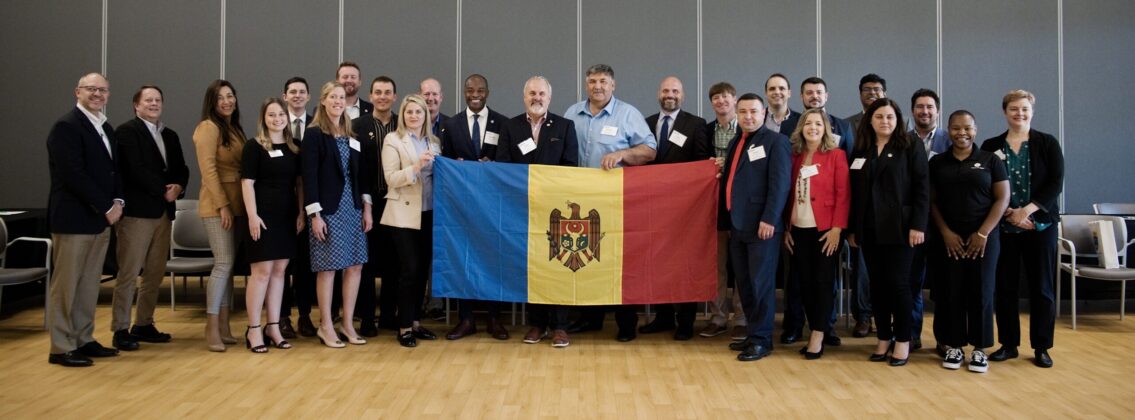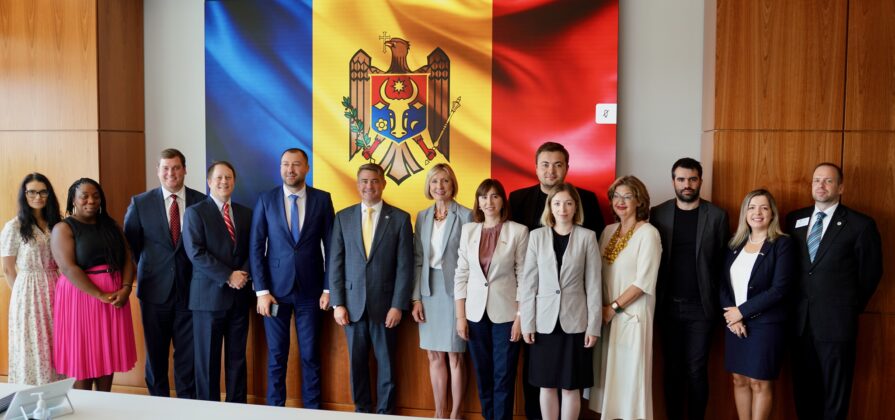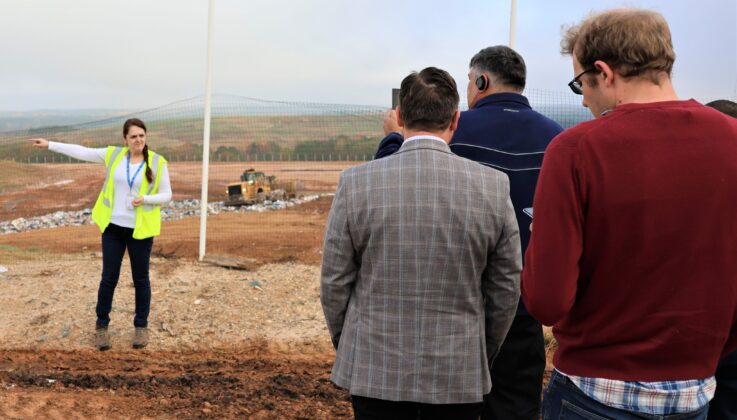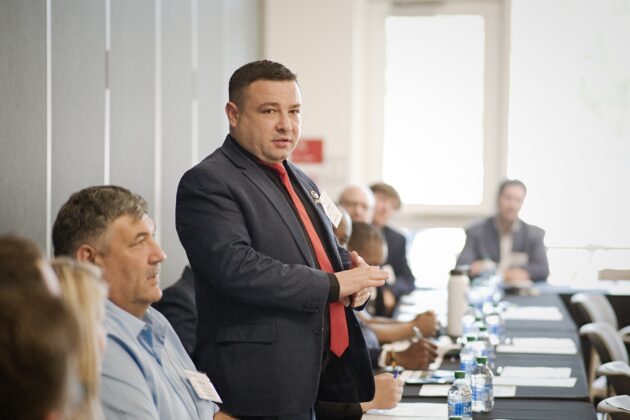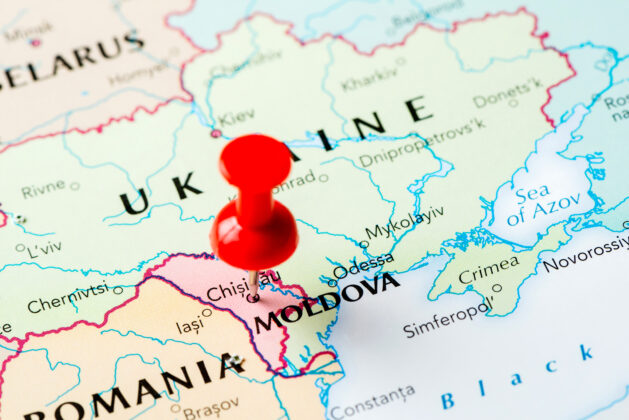Longtime partners, Moldova and North Carolina have achieved successes in a number of public service categories. Now, the focus has turned to cities.
Standing atop a landfill with seven members of the local government delegation of the country of Moldova, two observations come into focus. One, there exists in plain sight a network of public services that, despite giving shape to day-to-day life, are consistently overlooked and underappreciated. And two, the work that creates these public services is nothing short of a marvel. These Moldovan mayors and municipal professionals recognize both points immediately.
It’s a privilege for citizens to enjoy these local government services without much fanfare. Behind the curtain, a much more impressive and complicated picture emerges. The Moldovan delegation are here to get that glimpse, as part of a decades-long partnership between their country and North Carolina, in which ideas, lessons, trainings and support are exchanged. They’re here to figure out how to make this happen back at home, and their detailed, attentive questions reveal their sincerity. How much soil is needed to cover the garbage? How dense can this landfill hill become—how much garbage per square foot is being crushed into the earth? What about odors, regulations, separation of hazardous waste and construction debris and mattresses and batteries? These are not the inquiries of tourists, but rather of students and practitioners.
Today it’s the matter of waste management, but on other trips it has been other questions concerning the structure and operation of local government more broadly. Moldova faces geopolitical and economic issues that the United States does not, and yet the function of North Carolina cities offers the country a model for how to begin establishing the reliable and strong public foundation that is local government. It’s a stability that has eluded Moldova since its independence. However, the current makeup of city officials in the country of just over two million residents represent a tremendous chance at progress and a new way forward. They are young and idealistic, and their studies on the operation of a landfill are only the beginning of a long list of curiosities that all have the same ultimate intention: to better Moldova by adopting the best of North Carolina.
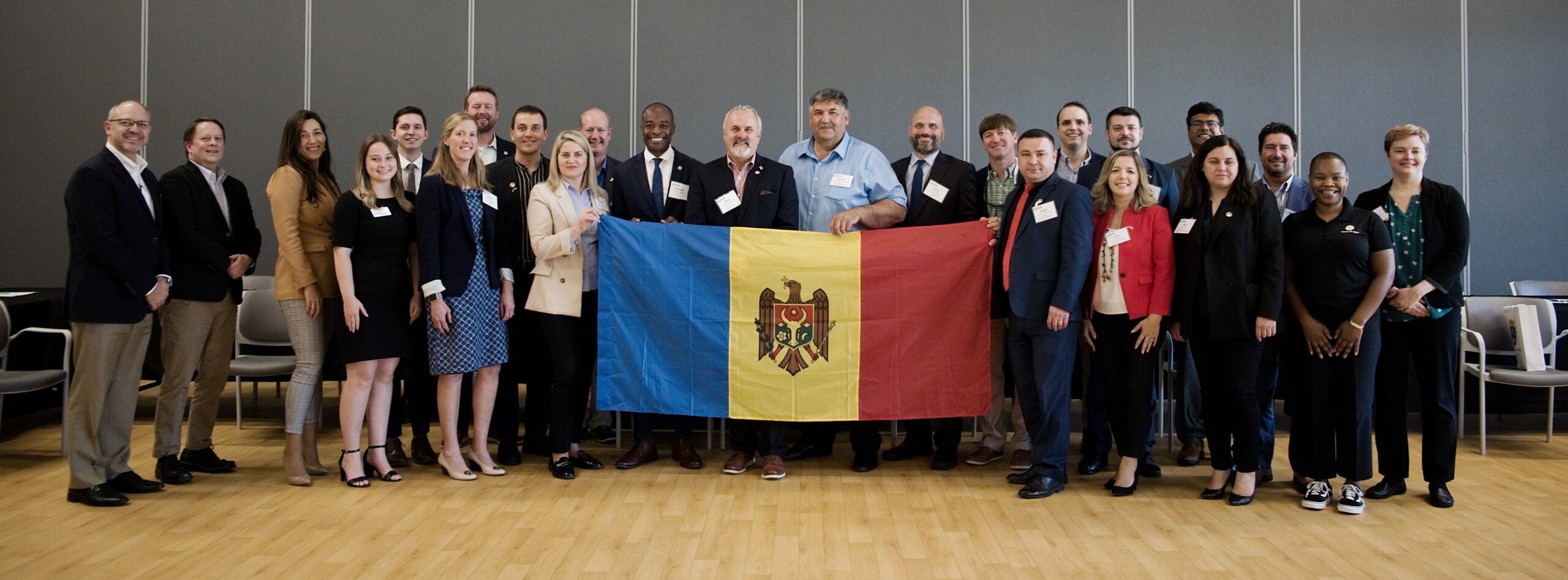
˘˘˘
Our city has a population of about 8,000. We are facing many crises happening at the local level and also within the international context. After two years of the pandemic, we have faced a refugee crisis, an energy crisis, and the people are distressed with these situations. We are in a complicated situation, but with the support of partnerships like this one, the European Union and the United States, we are able to face these issues at the right level.
Although it seems like we are on different continents, we have a common aim… This exchange helps us face the common issues we have, in protecting our planet for future generations.
» Olga Luchian, Deputy Mayor of Stefan Voda
˘˘˘
The North Carolina-Moldova relationship is firmly rooted in diplomacy. It began with the fall of the Soviet Union. American leadership at the time recognized that the newly independent countries of the USSR had practiced neither self-governance nor democracy for many years, and that their economic standing did not encourage development in those areas. Leaving it void, in the United States’ view, would not support either party’s interests. Thus, it became national policy to support those aims through the use of intergovernmental partnerships. As such, the United States National Guard State Partnership Program (SPP) was created in 1993. With a focus on Eastern Europe, SPP included pairings such as California and Ukraine, Indiana and Slovakia, and Alabama and Romania. Over the following three decades, SPP expanded globally, and now includes more than 80 state-country partnerships.
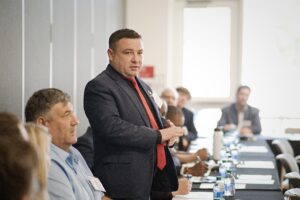
Initially the partnerships were predicated on security. Through the years, the civilian diplomacy aspect also blossomed. The National Guard now includes both elements of the program in its description: “Through SPP, the National Guard conducts military-to-military engagements in support of defense security goals but also leverages whole-of-society relationships and capabilities to facilitate broader interagency and corollary engagements spanning military, government, economic, and social spheres.”
North Carolina and Moldova were not a part of that initial partnership wave, and did not establish until 1996. Yet, despite the slightly late start, few, if any, partnerships are as strong, especially concerning the civilian-focused activities, according to North Carolina Secretary of State Elaine Marshall. Holding office since 1997, Marshall has been involved nearly the whole way, and played a central role when the civilian-to-civilian partnership was made official in 1999 with a document signing between Moldovan President Petru Lucinschi and North Carolina Governor Jim Hunt. “I was asked to co-chair the partnership from the very beginning, and I’m still at it,” Marshall told Southern City in a phone interview. It is this element of the relationship that has grown slowly and steadily and largely without interruption, now forming a vast apparatus of volunteerism, charity, and education.
“Once it started, it picked up steam,” said Marshall. “We have so much individual initiative going on with people that, for whatever their motivations might be, have bonded with Moldova… It’s people of goodwill wanting to make a difference.”
There are local dentists that travel each year to Moldova to provide care; educators that have established book-sharing programs with Moldovan schools and libraries; exchanges of supplies with hospitals; programs to improve healthcare, specifically as it relates to nurses; nonprofits dedicated to aiding Moldova; university exchange programs; and stateside, Russian-speaking Moldovans who volunteer to help with high school foreign language classes. “It’s all about personal connection,” said Marshall. “I believe so much in citizen diplomacy, and that’s what this is.”
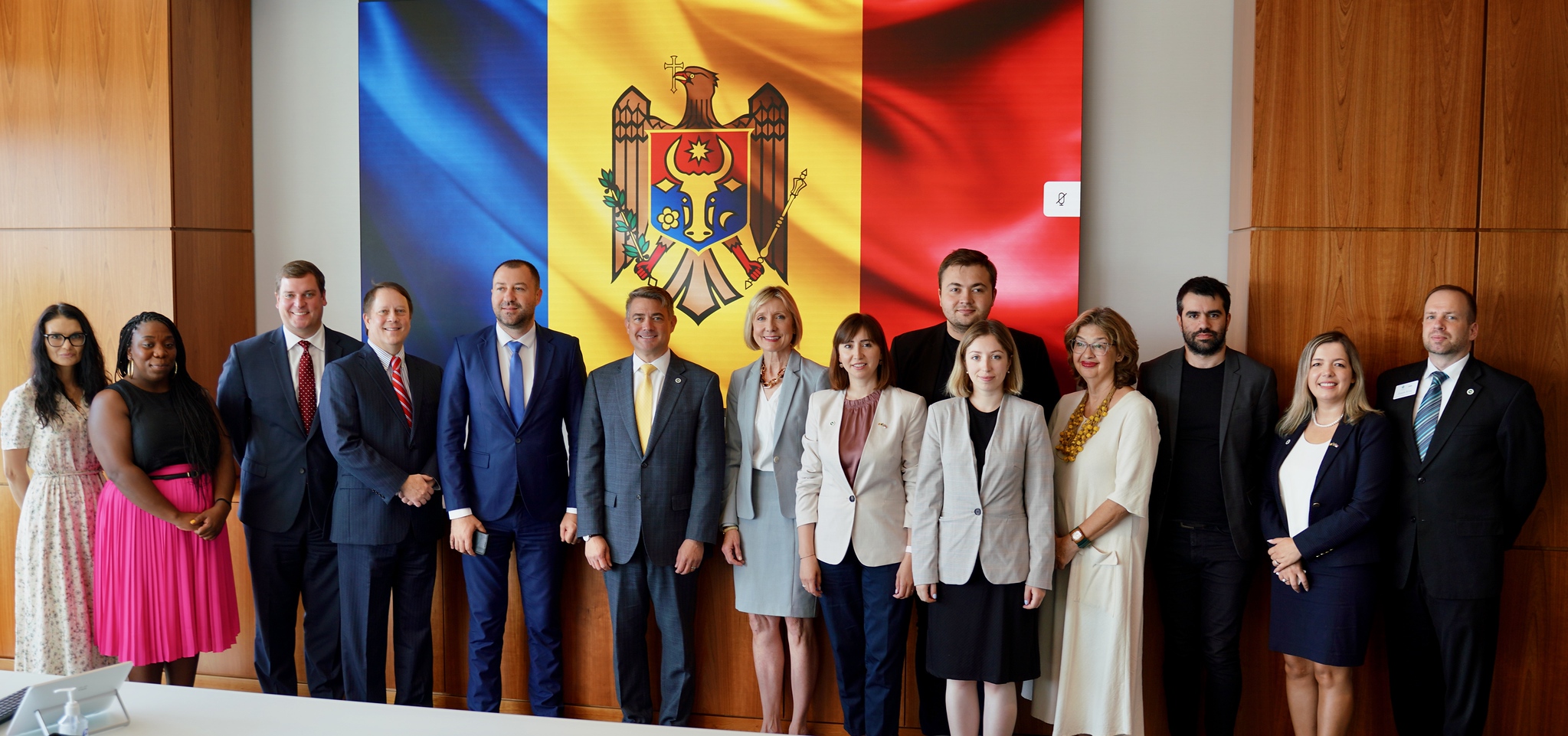 The governmental relationships have developed too, albeit at a different pace. Marshall is quick to note the geographic and political challenges that impede Moldova, which lies landlocked along the southwest border of Ukraine. Crises range from the country’s relationship with Russia to its economy to its difficult winters, and as it relates to government, there have been instances of corruption within Moldova over the past few decades that have stymied progress.
The governmental relationships have developed too, albeit at a different pace. Marshall is quick to note the geographic and political challenges that impede Moldova, which lies landlocked along the southwest border of Ukraine. Crises range from the country’s relationship with Russia to its economy to its difficult winters, and as it relates to government, there have been instances of corruption within Moldova over the past few decades that have stymied progress.
Those closely associated with the relationship, though, feel that this current crop of leaders is different, and that the local government partnership holds incredible potential. On this trip are two mayors, a deputy mayor, three other municipal officials, and a facilitator. Only one is older than 43. “There is something so promising about these mayors and local leaders,” said North Carolina League of Municipalities Executive Director Rose Vaughn Williams. In July, Williams met with a contingent of Moldovan Members of Parliament for discussions on the logistics of forming their own municipal league. “The questions they ask, their curiosity, the passion they show for their country—it was so inspiring to sit and speak with them.” Like with the local government leaders, the Members of Parliament too represent a youth movement in Moldova, with the average age of attendees being 33.
The focus has been on foundational issues—the behind-the-curtain issues. Examples include how best can Moldova train its municipal administrative workforce, and how can the country’s cities work together to advance its goals in unison. Then, of course, there are the specific services.
The topic on this day is solid waste in Wake County, and the tour is of the South Wake Landfill. While not a municipal operation at this location, many towns do run their own solid waste services, and like so many other services and programs, the local government lines often blur between county and city responsibility. For the Moldova delegation, it’s all transferable knowledge.
˘˘˘
Prior to my election as mayor, I used to manage all that is connected to public services and public utilities. That includes wastewater treatment and landfill management. I am connected to the mission of this group here in North Carolina. Although I have a background in this field, I have accrued additional knowledge with this visit… But we need a couple years more to reach you and advance as well. Because we come from a centralized system, generationally from the Soviet system, unfortunately people are not used to taking responsibility and giving much importance to this domain. They do not appreciate the work in this domain. We can change it. …
Besides the fact that I have gained from my experience here, the citizens are also expecting changes to be made. We hope that through these partnerships, we can grow together and the citizens can benefit… When the city halls are supporting from all sides, we see improvement. Not just through finances, but through expertise.
» Sergiu Andronachi, Mayor of Cimislia
˘˘˘
The landfill seems to work like a beehive. On their morning tour, conducted by staff and done in-depth over the course of three hours, guests are driven around in a bus and shown each phase of the operation, which run concurrently and neatly timed with one another. At the summit of the facility, everyone exits the bus to get a closer look. A parade of trucks work up the hill—which again, is compressed garbage—and dump their days pickup right at the feet of what look like bulldozers. They move the piles around for the crusher, an impossibly large and heavy vehicle that smashes garbage into the earth using metal spiked wheels. Alongside it are dirt trucks, at the ready to immediately cover the crushed load with a layer of soil. It’s a dozen or more vehicles beautifully choreographed and playing their parts to complete perhaps the most intentionally out-of-mind public service a locality can offer. Not many people see—or care to see—where their garbage ends up.
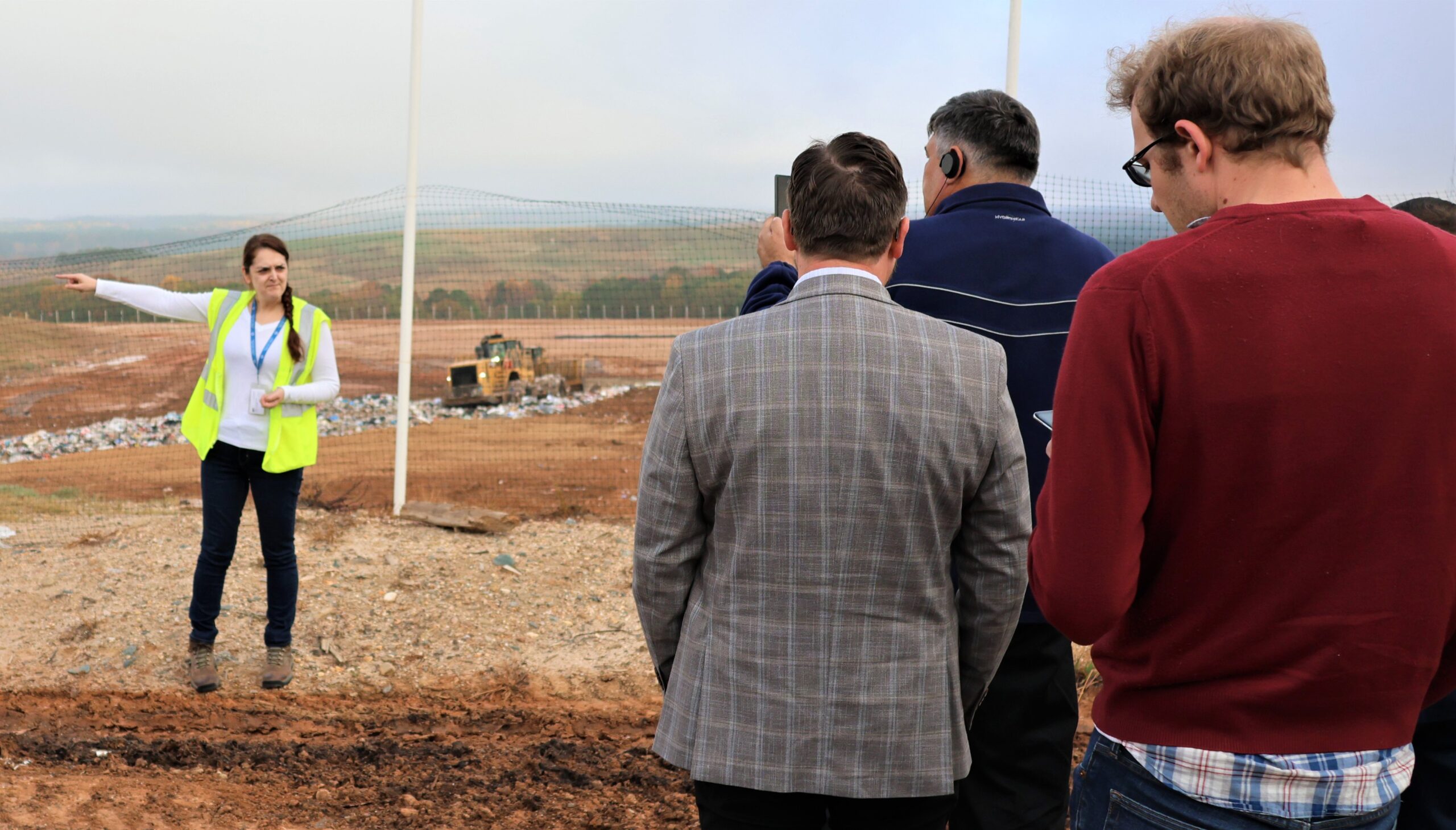
to the Moldovan delegation. Photo credit: Wake County.
Heading down the slope, there is still more to watch and appreciate. As this hill is nothing but waste and soil, it creates a great deal of gas emissions. The landfill collects these. Strewn about, looking like straws in a drink, are poles that collect these gases as they breach the surface. Those gases are then funneled together, down the slopes through a web of infrastructure, and into a building that rests at the base of the mounds. This is an energy plant, and it creates electricity using the gas emissions, powering the landfill itself. What remains is then sold into the larger electric grid. This landfill is self-sustaining. No emissions reach the atmosphere.
Starting from scratch, creating an operation like this seems insurmountably large and complex. And yet, that’s what the Moldovans are here to do: learn how to make these things happen back at home.
˘˘˘
I’ve been mayor for the last three years. During this short period, we’ve been able to implement multiple projects, but we have to admit that even with all the great things that are being done, we are behind when it comes to waste management. We are very grateful that we got to come to North Carolina to come get knowledge and information.
We are representatives of three mayoralties and four districts. We hope to establish partnerships long term with our counterparts here. We are convinced that this type of technological advancement is not possible only with the forces of the local public administration in Moldova, so we rely on these partnerships to enhance our capabilities. The state of North Carolina, with Secretary Marshall, has supported these types of initiatives that can help us and support us in this endeavor. Our hope is that we will have the same type of support in the sphere of waste management.
» Alexandru Bujorean, Mayor of Leova
˘˘˘
Just as there is immense value in seeing behind the scenes of a public service, so too is there value in seeing the perspective of your global peers. What can the local leaders of Moldova offer to the local leaders of NC? For one, it’s a return to basics.
The culmination of the Moldovan delegation’s trip was a meeting with the mayors and managers of several Wake County towns for presentations and a Q&A session. Participating were Apex, Holly Springs, and Fuquay-Varina, who each mapped out their current strategic issues and ways forward. They also, and perhaps most helpfully, detailed their organizational fundamentals. How does the city run? Who is in charge of different departments? How are services provided? Looking side-by-side at the challenges of the quickly-growing North Carolina towns with the challenges of Moldovan towns, the comparison is stark. Drilling deeper, though, into the essential functions—the goals of service, and of quality of life, and of security—the images begin to overlap. The differences dissolve. And from this viewpoint, so inspiringly motivated by hope and ambition on the part of the Moldovans, the promise of the relationship—to better Moldova by adopting the best of North Carolina—seems very much within reach.
Mayor Andronachi of Cimilslia, Moldova puts it succinctly: “If you can do, we can do it.”


